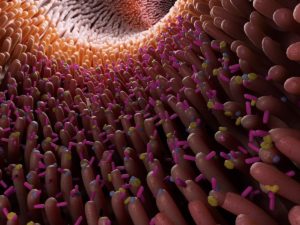CHEK2 is a tumour-suppressing gene which encodes for the CHK2 protein, a serine/threonine kinase which plays a major role in several cell signalling pathways, such as cell cycle arrest, apoptosis, and DNA repair mechanisms. It has been demonstrated in the last few years that CHEK2 heterozygotes – patients with one loss-of-function variant of the gene, have increased risks for breast or prostate cancer, depending on their gender.
The suggested read of the month highlights a new strategy for demonstrating the link between CHEK2 loss-of-function and prevalence for several other types of cancer. Indeed, in previous studies of the gene, the “phenotype-first” approach was used, and consisted of identifying families or individuals with cancer, then conducting genetic testing on the patients, and finally linking the found genetic mutation with the observed phenotype. This method tends to introduce bias in the study, as the selection of cases based on phenotype (especially when selected from clinical or family settings) may overestimate the strength of genotype-phenotype associations, as those identified may be more severe cases or come from families with a genetic predisposition. This is why, in the case of this new study, the method of genomic ascertainment was used, that is examining the medical records or health data of individuals who carry the CHEK2variant to observe any common patterns of disease or traits, such as cancer, in these individuals, and calculating how likely individuals with the mutation are to develop the associated disease, compared to those without the mutation. Since it does not focus solely on individuals with severe or early-onset disease, it may detect more subtle or late-onset manifestations of the genotype.
Genomic data were sourced from two large biobanks, which are large-scale, population-based repositories of biological samples and health data that support medical and genetic research aimed at understanding disease and improving health outcomes. For each variant, a classification was made according to pathogenicity, malignance, and mutation significance, and cancer risk was assessed by statistical analysis.
CHEK2 heterozygotes were found to have a significantly elevated risk for various cancers. Specifically, they exhibited increased susceptibility to breast and prostate cancers, in line with previous research that established a link between CHEK2 variants and these cancers. Beyond breast and prostate cancer, CHEK2 heterozygotes were also associated with a higher likelihood of developing cancers in the male genital organs, urinary tract, lymphoid tissue, and endocrine glands. This risk varied based on the type of CHEK2 variant (truncating or missense) and the specific cancer subtype.
Furthermore, CHEK2 heterozygotes tended to experience cancer at an earlier age than individuals without the mutation, though there were no significant differences in cancer onset age between carriers of truncating versus missense variants. Notably, amongst individuals who developed cancer, there was no significant difference in cancer-specific mortality between those with CHEK2-related cancers and those with cancers unrelated to CHEK2 in either cohort.
The findings affirm CHEK2 as a risk factor for breast and prostate cancer and further support the potential association with cancers of the kidney, bladder, and lymphoid tissues. This study’s genome-first approach enables an unbiased view, potentially minimising ascertainment bias present in family-history-based methods. In conclusion, this work calls for expanded cancer surveillance strategies for individuals with pathogenic CHEK2 variants to address these elevated risks effectively.
In the context of Movember and in order to raise awareness for men’s health issues such as prostate and testicular cancer, we at 4bases join the movement by presenting the HEVA pro kit which allows the identification of mutations in genes related to a plethora of cancers, including CHEK2 variants.
Kim, S. Y., Kim, J., Ramos, M., Haley, J., Smelser, D., Rao, H. S., Mirshahi, U. L., Graubard, B. I., Katki, H. A., Carey, D., & Stewart, D. R. (2024). Genomic ascertainment ofCHEK2-related cancer predisposition. medRxiv (Cold Spring Harbor Laboratory).





